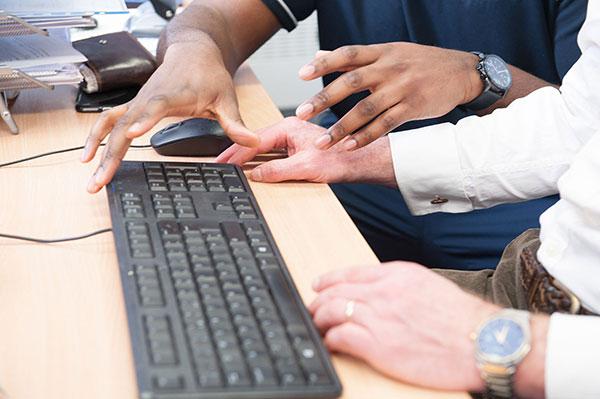How you can stay happy and healthy at work with the help of the CSP.

Many of us spend a large proportion of their time at work. It’s common to feel too busy doing our jobs to take the time to consider how it impacts on our health.
Office workers, in particular, spend hours sitting still and carrying out repetitive tasks. The human body isn’t designed for this; we’re supposed to be moving around, so all this time spent at a desk needs to be well managed.
Common causes of sickness absence include musculoskeletal conditions such as lower back pain, and repetitive strain injury which can cause discomfort in the arms, wrists, fingers, neck and shoulders.
Other problems include feeling pressurised, anxious and low in mood. Most adults experience these types of conditions from time to time but, if identified early and managed well, they should not result in time off from work.
How to help yourself
Looking for a private physio?
Use our Physio2u directory to find a private physiotherapist in your area today.
- Rotate your tasks - alternate computer and telephone use or, even better, go to speak to someone face-to-face
- Maintain good posture – don’t slump and slouch
- Try to get out of the office every day for some fresh air
- Pay attention to what your body is telling you. Report any health problems to your employer as soon as possible.
- Do simple desk-based stretching exercises whenever you can
Take micro-breaks
Try to take a break for a few minutes at least hourly. Remember that lunch or tea breaks and the rotation of tasks also provide excellent opportunities to get away from your desk. It’s a good idea to tell colleagues when you are going to be away, and you can remind them to take breaks too.
Remember!
Don’t skip meals; eat healthily and regularly to keep blood sugar levels stable and learn about foods that can boost concentration. Drink plenty of water.
At your desk

- Adjust the backrest of your chair so you can lean against it comfortably, with your lower back well supported and your feet flat on the floor or a footrest.
- Place your mouse within easy reach and support your forearm lightly on the desk. Move the mouse from your shoulder, not your wrist.
- If you spend long periods of time on the telephone, stand up to take every other call and preferably use a lightweight headset.
Stay fit for work
Physical activity will improve your health and fitness, bringing many benefits to help you get the most from work and life. An active lifestyle can give you more energy and boost your mood, keeping you alert and productive in your job.
Physiotherapists recommend that five times a week, all adults do 30 minutes of exercise that gets them slightly out of breath. If you don’t have time for a 30 minute session, break it up into three or four 10 minute chunks throughout the day.
Remember!
Physical activity can help you prevent or manage stress.
Feeling stressed?
Support from your employer can help you manage stresses that may affect your ability to work. By raising concerns early, you can catch problems before they have a chance to build up.
Build some exercise into your working day
Physiotherapists can advise on building easy, effective exercise into your daily work routine. You don’t have to divide your day into ‘work time’ and ‘exercise time’. Instead, incorporate some physical activity into your time at the office.

